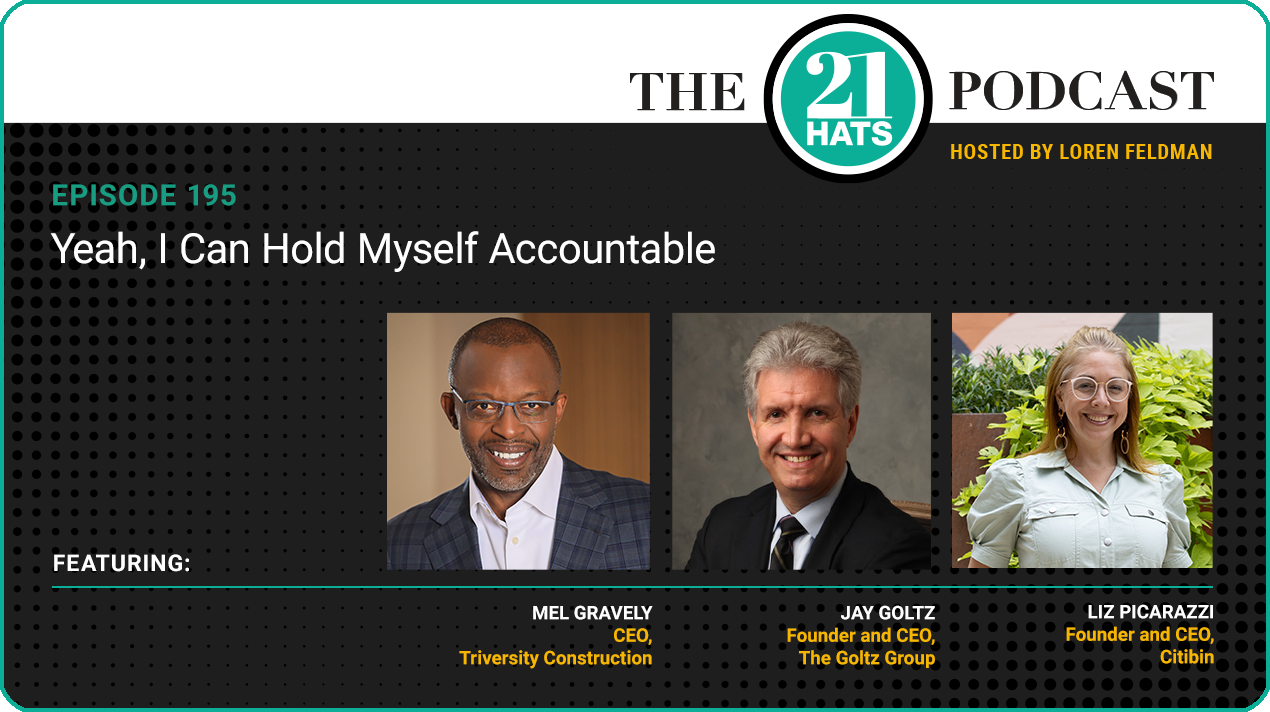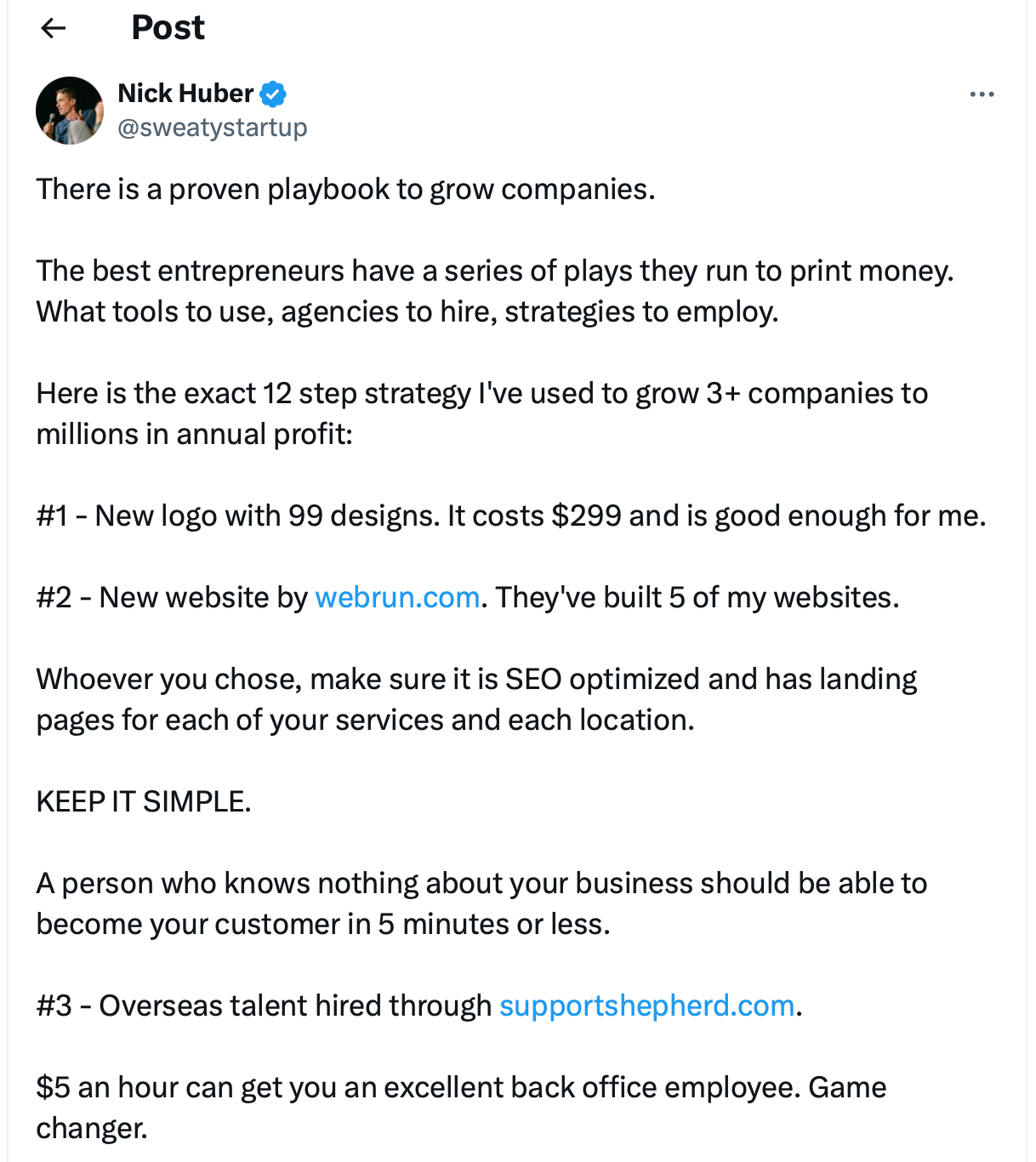Yeah, I Can Hold Myself Accountable
In this week’s podcast episode, the owners discuss the merits of creating a board of advisors.
Good Morning!
Here are today’s highlights:
The trade war with China is escalating.
A business owner suggests ways to fight back against Glassdoor.
The ban on non-competes doesn’t mean business owners can’t protect their secret sauce.
Nick Huber lays out his playbook for building businesses.
THE 21 HATS PODCAST
This week, in episode 195, Mel Gravely tells Jay Goltz and Liz Picarazzi about his recently executed succession plan, including what’s worked and what could have gone better. The main thing that could have gone better, Mel says, is his purchase of another small business where he says he misdiagnosed the challenges the business is confronting: “I thought they just had a bad model and they weren't managing it well. It was worse.” All of which leads to a discussion of the role that a board of advisors can play in helping an owner build a business. While Mel has said he wouldn’t run a lemonade stand without a board, Liz and Jay—like most business owners—have taken a different approach. The notion of having a board of advisors, Jay tells us, is something he struggles to get his head around. “I’ve been doing this for 45 years,” he says, “and I’ve never had anybody to answer to.”
Plus: with the talk of tariffs getting louder, Liz updates us on her search for an alternative to manufacturing her trash enclosures in China. “We really have to have a Plan B,” she says. “We'd be stupid not to have a Plan B.”
The tariff conversation has already proved prescient with President Biden just announcing a series of hikes on China, including raising the tariff on the aluminum Liz buys to 25 percent.
You can subscribe to the 21 Hats Podcast wherever you get podcasts.
TRADE
Now both political parties are looking to escalate the trade war with China: “One day after news broke that President Biden was planning to raise tariffs on Chinese electric vehicles to roughly 100 percent, Donald Trump moved to one-up his rival for the White House. ‘I will put a 200 percent tax on every car that comes in from those plants,’ the former president said at a rally in New Jersey on Saturday, referring to Chinese vehicles manufactured in Mexico.”
“The retort put on display a dynamic now at the heart of U.S. trade policy: The leaders of both political parties are racing each other to impose tough barriers on trade with China. What was once a lone effort by Trump to disrupt the bipartisan faith in free trade has become an establishment consensus of its own.”
“Beyond raising tariffs on electric vehicles, the White House said Tuesday that Biden was increasing a key tariff rate on steel and aluminum products to 25 percent from 7.5 percent, while the tariff on solar cells would rise to 50 percent from 25 percent, and a new duty on shipping cranes would be 25 percent.”
“Senior Biden administration officials said they delayed the start of some of the tariff increases to give U.S. industries time to rejigger their supply chains. The White House said the new tariffs would apply to $18 billion in products from China, with EV batteries, critical minerals, and medical products among the other goods targeted.”
“Biden’s approach is still narrower than Trump’s plans for a potential second term, which include imposing at least a 60-percent tariff on all goods from China and charging a 10-percent levy on every import.” READ MORE
HUMAN RESOURCES
Alan Pentz wants businesses to fight back against Glassdoor: “Let’s just get this over with up front: Glassdoor sucks. If I ever meet the founder, Richard Hohman, I’m going to punch him in the face (or at least say something rude). Employee reviews are fine but Glassdoor has an adverse-selection problem. Most reviews come from malcontents who were terrible employees and in some cases from people who aren’t and never were employees. And for small companies one review can be a big factor. You don’t have that many people in the company so some idiot who gets fired for stealing or having two jobs or being abusive to colleagues gets to kill your rating. But you can fight back, and I suggest you do.”
Solicit good reviews: “We improved our rating by asking for reviews during and right after orientation. People are learning about the company, are excited about their new job, and are generally positively inclined. It’s also an event where you can easily insert a solicitation into the process. If you aren’t hiring, make a list of all your happiest and best employees and start asking them for reviews one by one.”
Visit the site regularly: “I’d encourage you to have HR sign up for the site (officially) and go into the reviews and their fishbowl feature regularly. The fishbowl is their attempt to create social conversations amongst your employees on their site. You have to use a company email to register but your posts are anonymous. You want to keep a handle on conversation going on there and intervene if you need to.”
“Unfortunately, Glassdoor can be important for your company. Prospective hires look at it. Your competitors look at it. Your potential acquirers look at it. Etc. If you don’t stay on top of it, it’ll bite you in the ass.” READ MORE
THE ECONOMY
Producer prices rose again in April: “U.S. wholesale prices jumped 0.5 percent in April in another sign of sticky inflation. Economists polled by the Wall Street Journal had forecast a smaller 0.3 percent increase in the producer price index. Wholesale costs often foretell future inflation trends. The increase in wholesale prices over the past 12 months rose to 2.2 percent in April from 1.8 percent in the prior month and hit the highest level in a year.”
“A separate measure of wholesale prices that strips out volatile food and energy costs and trade margins climbed 0.4 percent last month, the government said. That was twice as much as expected.”
“The increase in these so-called core prices over the past year rose to 3.1 percent from 2.8 percent. It had fallen to as low as 2.5 percent last fall.” READ MORE
REGULATION
Gene Marks says most businesses should be able to get around the banning of non-competes: “How? By re-visiting and stepping up confidentiality agreements. Do business owners really care if an employee leaves their company to work for a competitor down the street or start their own competing business? Of course we hate to lose good talent, and every loss of a good worker is a failure. But we can’t control what people do. What we really care about is that the employee does not take our trade secrets with them for the benefit of their new employer. That’s the main reason why we make them sign non-competes. The good news for employers is that the non-compete ban doesn’t impact confidentiality or non-disclosure agreements.”
“So in the next four months, before the ban takes effect, my advice to all employers is to revisit these agreements and make them as iron-clad as possible, with draconian repercussions to any ex-employee (and their new employer) if there’s a whiff that customer lists, processes, supplier prices, or any other proprietary information has been taken.”
“I suggest using AI — ChatGPT, Gemini, CoPilot, or Anthropic — to take a first crack at this new agreement. After that you should take that first draft to a smart attorney who can give it even more teeth. Then you should have all of your key current and future employees sign this updated agreement as a condition of employment.” READ MORE
LITIGATION
Massachusetts is taking Uber and Lyft to court over the classification of gig workers: “The non-jury trial in Boston comes amid broader legal and political battles in the Democratic-led state and elsewhere nationally over the status of drivers for app-based companies whose rise has fueled the US gig worker economy. Massachusetts Attorney General Andrea Joy Campbell is asking a judge to conclude that drivers for Uber and Lyft are employees under state law and therefore entitled to benefits such as a minimum wage, overtime and earned sick time. Her office claims the companies for years misclassified thousands of Massachusetts drivers and cannot meet a three-part test under the state’s worker-friendly laws that would allow them to be deemed independent contractors.”
“Studies have shown that using contractors can cost companies as much as 30 percent less than using employees.”
“Uber and Lyft argue that they properly classified the drivers, saying they are not transportation companies that employ drivers but technology companies whose apps facilitate connections between drivers and potential riders.” READ MORE
RETAIL
A novelist fights back against book bans by opening a bookstore: “On a recent Sunday, Lauren Groff got out of bed at three in the morning, jolted by a mix of anxiety and adrenaline. It was opening day for The Lynx, Groff’s new bookstore in Gainesville, Fla., and her mind raced with all that could go wrong. So she drove over to the store, where she felt reassured by the presence of some 7,000 books, a collection she had helped to curate. ‘I like being there alone, because I’m surrounded by all of my friends,’ Groff, a best-selling novelist and three-time National Book Award finalist, said of the books. A few hours later, she was no longer alone.”
“By 10 a.m., about 100 people had lined up outside the store to watch as Groff cut the ribbon. More than 3,000 people showed up throughout the day for a series of author readings, folk music, live poetry composition and, of course, to buy books.”
“Groff and her husband, Clay Kallman, had toyed with the idea of opening a bookstore in Gainesville for more than a decade, but the timing never felt right. Groff’s writing career was taking off, and they had two young sons.”
“But last year, as book bans surged across Florida, they decided that their town needed an independent bookstore where titles that had been purged from libraries and classrooms would be on prominent display.”
“The store’s mission is also resonating outside of Florida. Since The Lynx opened, it has received about $1,000 in donations from around the country. Groff plans to use the funds to distribute free copies of banned titles to Florida residents who might not otherwise have access to them.” READ MORE
STARTUPS
Nick Huber of The Sweaty Startup offers his playbook for building businesses:
THE 21 HATS PODCAST: DASHBOARD
Gene Marks Explains “Open Banking:” This week, Gene talks about an intriguing banking trend that’s come out of Europe and could be headed our way. It sounds a little dicey, but it could take some of the work out of applying for a loan. Plus: business owners say they expect artificial intelligence to increase--not decrease--their headcount. Could they be right? And can we all agree on the definition of a small business?
You can subscribe to the 21 Hats Podcast wherever you get podcasts.
Thanks for reading, everyone. — Loren





